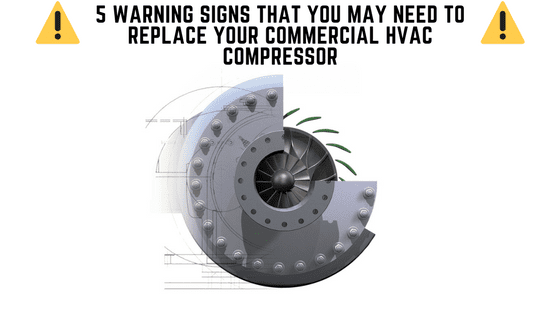The compressor is one of the most vital components of a commercial HVAC system. If something goes wrong with it, identifying the problem right away can help you prevent further and potentially severe damage to your central cooling system. In this blog post, we’re going to talk about five warning signs of compressor failure so that you can easily recognize when you need to replace your commercial HVAC compressor.
Decreased Cooling Capacity
Decreased cooling capacity indicates that your HVAC compressor is running, but it may not function well enough to maintain the temperature and humidity at the required levels. A malfunctioning compressor can prevent the refrigerant from circulating properly through the system, hindering the entire cooling process.
In addition to a failing compressor, other problems that can decrease the cooling capacity of an HVAC system include clogged air filters, dirty condenser coils, frozen evaporator coils, a refrigerant leak, and/or a failing condenser. Irrespective of the problems you might suspect, the best option is to bring in a professional HVAC technician to inspect your unit.
Poor Ventilation
Inconsistent or diminished ventilation is another sign indicating that your commercial HVAC compressor may be failing. Airflow that decreases considerably will provide insufficient cool air throughout your commercial facility. As a result, certain areas may be warmer than others.
While the trouble might be with your air filters, ductwork, or other system components, the ventilation is generated by the air handler. Since a faulty air handler won’t be able to provide as much air as before, your entire HVAC unit will eventually fail in meeting its purpose.
The Circuit Breaker Trips When the Compressor Starts
A commercial HVAC compressor that’s malfunctioning, working too hard, or overheating can cause the circuit breaker to trip in order to prevent overload and protect the system. In this case, resetting the circuit breaker won’t solve the root cause of the problem. If your HVAC unit loses power frequently, make sure that you call in an HVAC technician for a detailed inspection of your system and electric circuit.
Unfamiliar Noises
Any strange or unusually loud noises are a sign that your HVAC compressor may fail soon. If the compressor is making rattling, rumbling, or clicking noises on startup, you should turn off your HVAC unit immediately. In addition to a malfunctioning compressor, unfamiliar noises could mean that a fan motor has become misaligned, or that one or more components inside the compressor has excessive damage.
If you hear any unfamiliar noises from your system, having it checked by a professional as soon as possible will allow you to diagnose the problem accurately and solve it before it causes further damage to the unit.
Conversely, if you don’t hear any noises indicating that the compressor is turning on, it’s possible that an electrical relay has failed to provide power. In this case, replacing the faulty relay switch with a new one will most probably solve the problem.
Refrigerant Leaks
Refrigerant leaks will compromise not only the performance and efficiency of your commercial HVAC system but also the safety of your compressor. That is because a low level of refrigerant will make your system work harder and run longer, which in turn will increase the wear and tear on your compressor. Eventually, the compressor will begin to malfunction.
A commercial HVAC compressor may fail due to different reasons, including improper installation, lack of maintenance, excessive wear and tear, or simply age. In order to extend the life of your compressor, it’s critical that you pay attention to several warning signs of compressor failure as mentioned above and have a professional technician perform regular maintenance.
If you you’re having problems with your commercial HVAC compressor, feel free to get in touch with Compressors Unlimited today! Our professionals will be able to recommend the right remanufactured replacement compressor so that you can get your HVAC system back in proper working condition.












